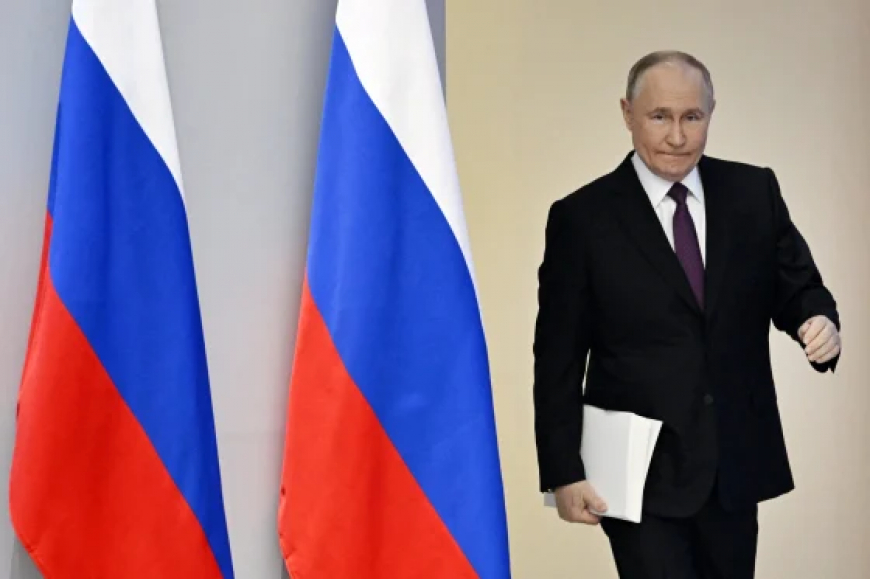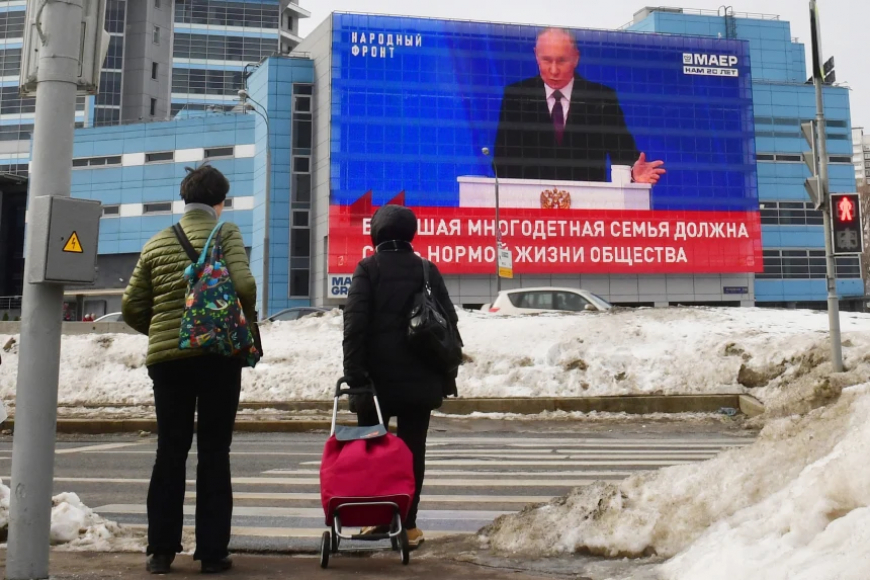Putin warns the West that sending troops to Ukraine risks a nuclear war

Russian President Vladimir Putin stepped up his threats against Western countries Thursday, warning that if they send their own troops into Ukraine they risk global nuclear war.
Putin issued the threat at the top of his annual state of the nation address, ahead of a presidential election next month that he is certain to win. He spoke for more than two hours to Russia's Federal Assembly at Moscow's vast and grand Gostiny Dvor conference center, a stone's throw from the Kremlin, surrounded by typically tight security with the surrounding streets cordoned off.
Putin covered an array of topics, from Russia's low birthrate to its need for better broadband coverage. But top of the agenda was his warning against deepening Western involvement in Ukraine.
His comments came after French President Emmanuel Macron suggested this week that NATO allies could send troops to Ukraine in the future, rather than just funding and arming the country indirectly. Macron’s suggestion was swiftly rejected by the United States and others, but Putin said that such a development would risk a wider war with potentially apocalyptic consequences.
“This is very dangerous because it could actually trigger the use of nuclear weapons,” he said. “Do they not understand that?”
He said his strategic nuclear forces were at "full readiness" and suggested that a hypersonic nuclear weapon he first mentioned in 2018 was approaching a full state of readiness — a claim that cannot be verified.
A spokesperson for the National Security Council told NBC News that “Russia’s nuclear rhetoric is reckless and irresponsible. We will continue to support Ukraine as they defend themselves from Russian aggression.”
“We have not seen any reason to adjust our own nuclear posture, nor any indications that Russia is preparing to use a nuclear weapon,” the spokesperson added.
The NSC reiterated Tuesday that the U.S. will not send troops to fight in Ukraine.
Putin also denied U.S. intelligence that said Russia was developing a space-based nuclear weapon designed to target American satellites.
The idea that Russia is "preparing to launch a nuclear attack in space" was "just a lie to make us look bad," he said.

Putin has often made such threats over the past two years since his full-scale invasion of Ukraine. But this week’s warning was, in the eyes of some observers, his most pointed to date.
Putin’s annual address comes at a crucial moment for the Kremlin, with its forces advancing in Ukraine ahead of an election that will reinforce his rule. The death of opposition leader Alexei Navalny and a slew of domestic issues have fueled criticism at home and abroad, but Putin will be boosted by growing signs of wavering Western support for Kyiv.
On Monday, Macron caused a stir by suggesting that the West “should not exclude” the possibility of sending troops to Ukraine. This would be a huge practical and symbolic step for allied support of Kyiv, which has so far extended to providing billions of dollars for its defense but has deliberately stopped short of sending forces for fear of starting a direct war with nuclear-armed Russia.
The U.S. and others quickly poured cold water on the idea, with the White House saying that it had “been clear that the U.S. will not send troops to fight in Ukraine.”
Mark Galeotti, head of the consultancy Mayak Intelligence and an honorary professor at University College London, said Macron had handed Putin a “propaganda gift” because it boosted his narrative that Moscow is fighting the West at large, rather than just Ukraine.
During Putin’s speech, “his reference to potential NATO deployments to Ukraine was less, in my opinion, about warning off the West so much as using it to reinforce his message that this is a struggle against the whole collective West,” Galeotti told NBC News. “Macron gave him something of a propaganda gift.”

Large screens displayed a broadcast of Putin's annual state of the nation address in Moscow on Thursday.
Five days ago, it was the second anniversary of Moscow’s full-scale invasion of Ukraine, a war that started badly for Russia with heavy troop losses but has recently seen battlefield gains for the Kremlin’s war machine — and fears that if Western support wavers, Ukraine may struggle to reverse them.
Key to both Putin and Ukraine’s future is who wins the American election.
President Joe Biden recently called Putin a “crazy SOB” for making nuclear threats against the West. Putin called the comments “rude” but nonetheless said he would prefer the incumbent in the White House to former President Donald Trump. That's despite Trump suggesting he would allow Russia to attack NATO allies, and saying he would halt military aid to Ukraine, which would cripple Kyiv's resistance and hand a huge boost to Russia.
A day after the address is the funeral of arch Kremlin critic Alexei Navalny, who died in an Arctic penal colony Feb. 16 in what his family and team say was a Putin-directed killing, something the Kremlin denies.
Navalny was a rare voice of dissent in Russia, where Putin has stamped out most forms of political opposition, independent media and free speech. In March, Putin is running for a fifth term in office but the election will, in reality, be a de facto coronation. With all his real adversaries in prison, exiled or dead, his landslide victory is all but certain.

 Phương Nhung
Phương Nhung 





